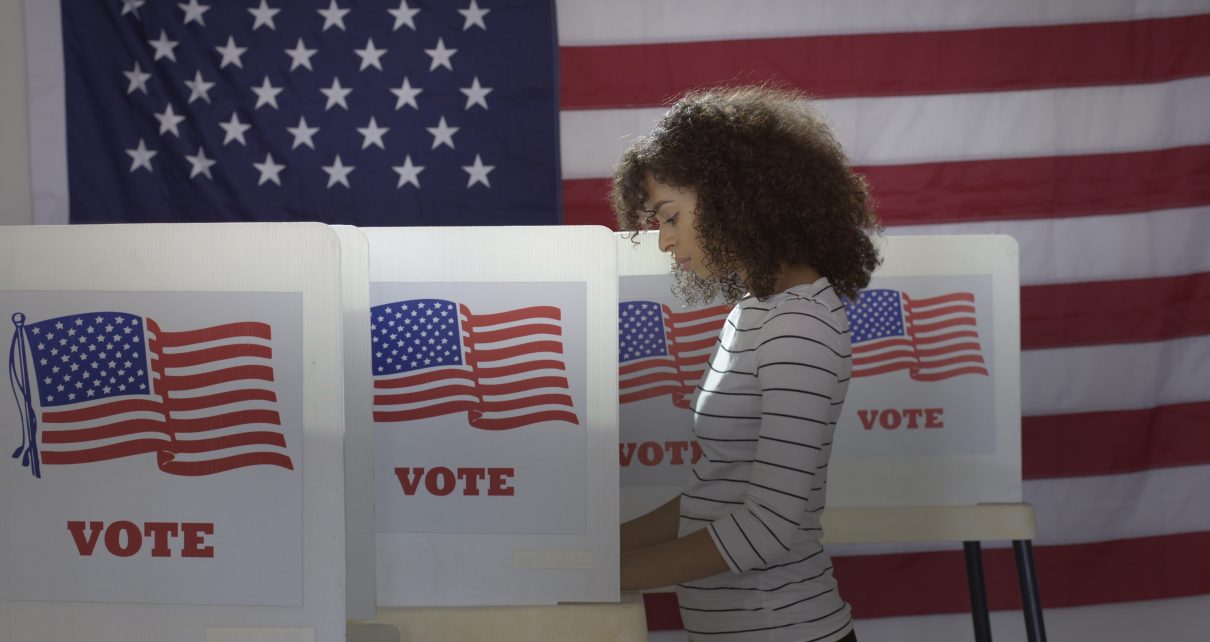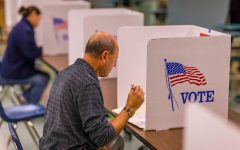
Woman in polling station, voting in a booth with US flag in background. (Photo: vesperstock/Shutterstock)
California Voter Registration Provisions
A person entitled to register to vote must be a U.S. citizen, a resident of California, not imprisoned on a felony
By Chris Micheli, February 19, 2022 8:15 am
California’s Elections Code contains numerous voter registration provisions. Division 2 (“Voters”), Chapter 2 (“Registration”), Article 1 contains General Provisions and includes Sections 2100 – 2124. Section 2100 prohibits a person from being registered except upon the production and filing of a certified copy of a judgment of the superior court directing registration to be made.
Section 2101 requires a person entitled to register to vote to be a United States citizen, a resident of California, not imprisoned for the conviction of a felony, and at least 18 years of age at the time of the next election.
Section 2102 provides that a person is prohibited from registering as a voter except by affidavit of registration. The affidavit of registration must be mailed or delivered to the county elections official and set forth all of the facts required to be shown by this chapter.
For purposes of verifying a signature on a recall, initiative, or referendum petition or a signature on a nomination paper or any other election petition or election paper, a properly executed affidavit of registration is deemed effective for verification purposes if both of the following conditions are satisfied:
- The affidavit is signed on the same date or a date before the signing of the petition or paper.
- The affidavit is received by the county elections official on or before the date on which the petition or paper is filed.
Section 2103 provides that “it is the intent of the Legislature that the election board of each county, in order to promote and encourage voter registrations, shall establish a sufficient number of registration places throughout the county, and outside the county courthouse, for the convenience of persons desiring to register, to the end that registration may be maintained at a high level.
“It is also the intent of the Legislature that county elections officials, in order to promote and encourage voter registrations, shall enlist the support and cooperation of interested citizens and organizations in such a way as to reach most effectively every resident of the county.
“It is also the intent of the Legislature that non-English-speaking citizens, like all other citizens, should be encouraged to vote. Therefore, appropriate efforts should be made to minimize obstacles to registration by citizens who lack sufficient skill in English to register without assistance.
“It is the intent of the Legislature that county elections officials be permitted to distribute affidavits of registration and voter registration cards, in all languages required the federal Voting Rights Act of 1965, by using the county’s Internet Web site.”
Section 2105 also provides that it is the intent of the Legislature that voter registration be maintained at the highest possible level. The Secretary of State is required to adopt regulations requiring each county to design and implement programs intended to identify qualified electors who are not registered voters, and to register those persons to vote.
Section 2105.5 requires the Department of Corrections and Rehabilitation to establish and maintain on the department’s Internet Web site a hyperlink to the Internet Web site at which information provided by the Secretary of State regarding voting rights for persons with a criminal history may be found.
Each county probation department is required to (1) establish and maintain on the county probation department’s Internet Web site a hyperlink to the Internet Web site at which information provided by the Secretary of State regarding voting rights for persons with a criminal history may be found, and (2) post, in each probation office where probationers are seen, a notice that contains the Internet Web site address at which information provided by the Secretary of State regarding voting rights for persons with a criminal history may be found.
Section 2105.6 requires the Department of Corrections and Rehabilitation to provide each person on parole under its jurisdiction, upon that person’s request made at any time during the parole, information provided by the Secretary of State regarding voting rights for persons with a criminal history.
Section 2105.7 requires a state or local juvenile detention facility, including, but not limited to, a juvenile hall, juvenile ranch, juvenile camp, or a facility of the Department of Corrections and Rehabilitation, Division of Juvenile Justice, to assist individuals to register to vote.
Section 2106 requires a program adopted by a county that is designed to encourage the registration of electors, to contain the following statement in printed literature or media announcements made in connection with the program: “A person entitled to register to vote must be a United States citizen, a resident of California, not currently imprisoned in a state or federal prison for the conviction of a felony, and at least 18 years of age at the time of the election.”
Section 2111 provides that a person may prove he or she is a citizen by his or her certification under penalty of perjury on the affidavit of registration. Section 2112 states that the fact that a person certifies to his or her United States citizenship by signing his or her affidavit of registration is deemed evidence of citizenship for voting purposes only.
Section 2114 provides that the county elections official of any county in this state may receive the affidavit of registration of any elector who resides or claims residence in another county in this state. The affidavit must be forwarded to the county elections official of the county in which the elector resides.
Section 2115 specifies that, whenever a voter, between the time of that person’s last registration and the time for the closing of registration for any given election, has lawfully changed his or her surname, the voter must reregister under the new or changed name.
Section 2116 provides that, whenever a voter, between the time of that person’s last voter registration and the time for the closing of registration for any given election, has changed his or her residence address by moving, the voter must execute a new affidavit of registration or a notice or a letter of the change of address in order to be eligible to vote at the next election.
Section 2119 requires the county elections official to accept affidavits of registration at all times except during the 14 days immediately preceding an election, when registration is required to cease for that election as to electors residing in the territory within which the election is held.
Section 2119.5 provides that, from the 14th day immediately preceding an election until the close of polls on election day, in lieu of executing a new affidavit of registration for a change of address within the same county, the county elections official must accept a written request by a voter that contains specified information.
The written request must be delivered to the county elections official’s office or to any location that offers conditional voter registration and at which a ballot can be issued. Following delivery to such a location, the county elections official is required to issue a ballot in accordance with specified requirements.
Section 2120 provides that, if the county elections official receives a letter from a voter stating that the voter has moved to a new address in another county in the state and the voter provides the new address, the elections official must immediately update the voter’s registration and the former address is maintained with the voter record.
If the county elections official receives a letter from a voter stating that the voter has moved to a new address in another county in the state and the voter does not provide the new address, the elections official must cancel the old registration for any election occurring at least 15 days after the receipt of the letter.
Section 2121 prohibits fees from being charged for registration. Section 2122 authorizes the county elections official to cause to be written or printed upon the top margin, or in the body of the affidavit, in addition to any matter provided for in this code, any words necessary or convenient to designate the precinct, district, or political subdivision for which the affidavit is taken, or to indicate any removal or transfer of registration.
Section 2123 specifies that no amendment by the Legislature can provide for a general biennial or other periodic reregistration of voters.
Section 2124 requires the Secretary of State, by regulation, to adopt uniform standards for proof of residency, which apply in all instances where voters and new registrants are required by law to prove residency.
Article 2 deals with reimbursable voter outreach costs. Section 2130 requires the Controller to allocate and disburse to counties the amounts necessary to reimburse them for net costs incurred by them in complying with the voter registration provisions, including the provisions authorizing voter registration by mail and voter outreach programs. The Secretary of State, in consultation with the Controller, is required to develop a formula for the reimbursement of these costs. These claims must be submitted to the Controller by February 15 in the year following the fiscal year in which the costs were incurred.
Section 2131 authorizes the Secretary of State may provide grants to local elections officials, nonprofit corporations, and unincorporated associations for the following purposes:
- To conduct voter outreach and voter education programs, in accordance with the requirements of the Help America Vote Act of 2002 (P.L. 107-252), using funds provided to the state.
- To increase accessibility for eligible voters with disabilities, in accordance with the requirements of the Help America Vote Act of 2002 (P.L. 107-252), using funds provided to the state.
Article 3 deals with registration procedures. Section 2138 provides that individuals and organizations distributing voter registration cards and who receive completed voter registration cards from voters are required to return the completed cards to the county elections official or deposit the cards in the postal service within three days, excluding Saturdays, Sundays, and state holidays, of receipt from a voter.
Section 2138.5 specifies that an affiant’s driver’s license number, identification card number, social security number, and signature contained on an affidavit of registration are confidential and must not be disclosed by an individual or organization that distributes voter registration cards, or by a person entrusted with an affidavit of registration from an elector.
Section 2139 provides that, on the day of the close of registration for any election all individuals and organizations that have submitted plans for distribution must immediately return all completed affidavits of registration in their possession to the county elections official. Unused affidavits must be returned upon completion of the distribution plan.
Section 2140 requires the county elections official to report to the district attorney of the county, under oath, the name of any individuals or organizations that have submitted plans for distribution who have not complied with this article.
Section 2142 provides that, if the county elections official refuses to register a qualified elector in the county, the elector may proceed by action in the superior court to compel his or her registration.
Section 2143 prohibits costs from being recovered against the county elections official in any action under this chapter, unless it is alleged in the complaint, and established on the trial, that the county elections official knowingly and willfully violated his or her duty.
- This Is an Interesting Limit on Rulemaking Power - February 23, 2026
- Miscellaneous Civil Action Proceedings - February 23, 2026
- Probate Code Could Be a Basis for Statutory Interpretation Principles - February 22, 2026





One thought on “California Voter Registration Provisions”